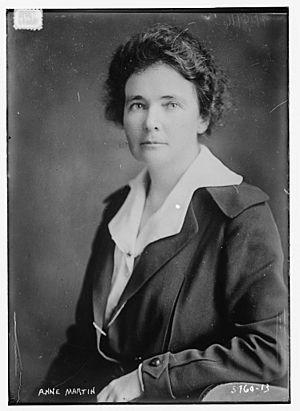Anne Henrietta Martin facts for kids
Quick facts for kids
Anne Henrietta Martin
|
|
|---|---|

Anne Henrietta Martin in 1916
|
|
| Born | September 30, 1875 Empire City, Nevada |
| Died | April 15, 1951 (aged 75) Carmel, California |
| Pen name | Anne O'Hara |
| Occupation | Suffragist, pacifist, author |
| Language | English |
| Nationality | American |
| Citizenship | American |
| Education | Bishop Whitaker's School for Girls |
| Alma mater |
|
| Relatives | William O'Hara Martin, Louise Stadtmuller Martin |
Anne Henrietta Martin (born September 30, 1875 – died April 15, 1951) was an important American woman. She was known by the nickname Little Governor Anne. Anne was a suffragist, meaning she worked hard to get women the right to vote. She was also a pacifist, someone who believes in peaceful ways to solve problems. Anne was also an author.
Her biggest achievement was leading the effort in Nevada that gave women the right to vote. She was the first head of the history department at the University of Nevada. This was from 1897 to 1901. She also worked with the suffrage movement in England between 1909 and 1911. There, she worked with famous activist Emmeline Pankhurst.
In 1912, she became the president of the Nevada Equal Franchise Society. Later, in 1916, she was the first national chairman of the National Woman's Party. Anne Martin was also the first woman ever to run for the United States Senate. She ran twice, in 1918 and 1920, but did not win.
Anne's Early Life and Education
Anne Martin was born in Empire City, Nevada. Her father, William O'Hara Martin, was of Irish background. He served as a state senator in Nevada. Her mother, Louise Stadtmuller Martin, was from Bavaria.
Anne went to Bishop Whitaker's School for Girls in Reno. She then attended the University of Nevada from 1891 to 1894. There, she earned a degree in History. She continued her studies at Stanford University. She earned a second Bachelor of Arts degree in 1896. In 1897, she received a Master of Arts degree in History from Stanford.
Her Career and Activism
In 1897, Anne Martin started the history department at the University of Nevada. After two years, she left to study at other universities. These included Columbia University, University of London, and University of Leipzig. She also studied art at Chase's Art School. She returned to the University of Nevada's history department from 1901 to 1903.
When her father passed away in 1901, it deeply affected her. She realized she needed to fight for women's rights. She felt she was "alone in my family against a man-controlled world."
Anne traveled a lot in Europe and Asia. She saw the women's rights movement growing in England from 1909 to 1911. She became a Fabian Socialist, which is a group that believes in gradual social change. During this time, she wrote short stories and political articles. Sometimes, she used the pen name Anne O'Hara. In 1910, she was detained in England while working to help British women get the right to vote.
After returning to Nevada in 1911, she became a leader in the suffrage movement. In February 1912, she became president of the Nevada Equal Franchise Society. She organized a campaign across the state's deserts. Her efforts convinced male voters to give women the right to vote on November 3, 1914. This was a huge success!
Because of her success, she became a national speaker. She joined the executive committees of the National American Woman Suffrage Association and the Congressional Union. In 1916, Anne helped organize women voters in the Western states. They worked to challenge the Democratic Party.
Anne Martin was also one of the Silent Sentinels. These were women from the National Woman's Party who stood silently outside the White House. They were protesting for women's right to vote. On July 14, 1917, she was part of this protest. She was briefly held at the Occoquan Workhouse. However, President Woodrow Wilson pardoned her less than a week later.
In 1918, Anne Martin made history. She was the first American woman to run for the U.S. Senate, representing Nevada. Her campaigns focused on how women could improve politics. She wanted better working conditions for everyone. She also supported nationalizing railroads and public utilities.
Between her 1918 and 1920 campaigns, Anne wrote many articles and essays. In these writings, she encouraged women to create their own political groups.
In 1921, Anne moved to Carmel, California. She recovered from a heart attack in 1930. In 1945, the University of Nevada gave her an honorary Doctorate of Laws degree. She also wrote articles for the Encyclopædia Britannica. One was about Josephine Butler in 1944.
Death
Anne Henrietta Martin passed away in Carmel, California, in 1951.
 | Calvin Brent |
 | Walter T. Bailey |
 | Martha Cassell Thompson |
 | Alberta Jeannette Cassell |

